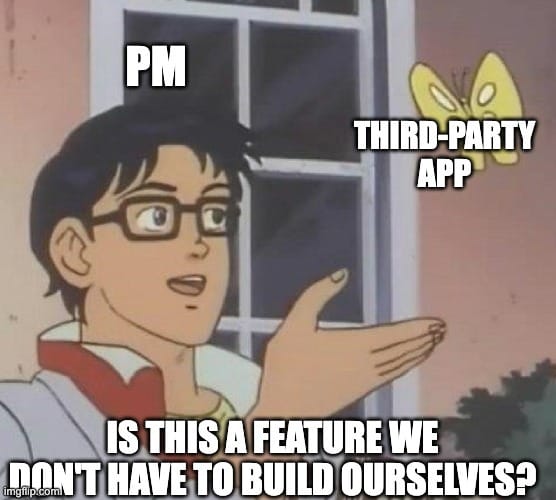Summary
The word “platform” gets thrown around a lot in tech, but actually has a specific meaning when you dig into it.
Software platforms like Salesforce or Shopify enable other products, services, and interactions to be built on top of it. It’s a foundation and ecosystem enabler.
Product leaders who want growth to be fueled by the successes of those who build on top of their product should invest in platform initiatives.
Why is “platform” a term used so frequently?
Product teams like to call their product a platform because it sounds bigger, more powerful, and more strategic.
Investors and marketers like it too because platforms are seen as sticky (high retention), scalable, and long-term valuable.

These are good reasons to call your product a platform to customers and investors, since what they believe about your longevity and value proposition is really important to growing.
But beyond positioning, what actually makes a software product a “platform?”
What is a platform?
At its core, a software platform enables other products, services, and workflows to be built on top of itself by users, third parties, and even the platform itself.
It’s an ecosystem enabler, since it creates a whole new ecosystem or market for value to be created, extended, and connected.
Here’s some key characteristics of a platform you can think about:
Extensibility - can others build on top of it? This could be through more technical methods like an API, SDKs, or custom code. But, it could also be through less technical methods like a WYSIWYG editor, no-code, and drag-and-drop building blocks.
Example: Salesforce lets businesses create any application they can imagine using SDKs.
Multi-sided participation - are these apps reusable, shareable, or discoverable? Can the app creators provide them to end users on the platform?
Example: Shopify connects app developers to the millions of businesses that need all kinds of custom logic and behavior on top of their stores.
Network effects - does the value of the platform grow as it gains more users or builders?
Example: As more apps were built into Apple’s App Store, the iPhone transformed from a phone into a personal bridge to the entire digital world.
Governance - how does the platform provide guardrails to how apps are shared, monetized, and used?
Example: Rippling protects their customers’ sensitive employee data by managing how third-party apps access end user information.
Why wouldn’t you want your software to be a platform?
Let’s say you have a software product. Should you invest in turning it into a platform?
It depends on what you see as a long-term product strategy for how to compound the value your software creates for others and how to defend it from being commoditized.
A common conception we hear is that there aren’t enough end users to justify all the work. This is true in today’s world, where supporting all the ecosystem infrastructure is very hard and time-consuming to build.
But what if that wasn’t a factor because there is a tool that can spin it all up for you in minutes, not months? (/plug)
Why would you want your software to be a platform?
If you see how extensibility and network effects help you grow… if you see how your end users would need your help to make sure that third party apps behave responsibly… These are good reasons to consider investing more in your platform initiatives.
Extensibility does not have to mean for the purposes of sharing, too. It’s an incredibly powerful mechanism to let each user customize the product to exactly what they want.
The best part of building a platform: your builders’ successes are your successes. You’ll be delighted to see all the use cases and workflows that are born that you never imagined. And these user outcomes will be ones that you do not need to build and support yourself.

